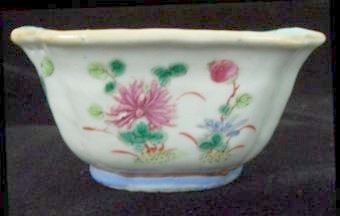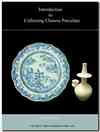Antique Appraisal
Authentication and Antique Appraisal
An antique appraisal will require that the appraiser authenticates an antique item and at the same time puts a value on it.
If you need to
know the value for insurance purposes or similar, or if you want to sell
it, you can ask a professional antique appraiser for an appraisal. The appraiser
will have to clarify authenticity first before putting a value on it.
|
If you own an antique item and wish to know more about it, you can
request a knowledgeable collector for an opinion on its authenticity,
but this may not necessarily clarify its value. Especially if it concerns Chinese antiques, the average collector may not know enough about
an item's authenticity. |
|
| Even if you have sufficient specialist knowledge to identify or authenticate the antique yourself, it may still be a good idea to ask for an appraisal, or better more than one, if a costly antique is involved. Authenticating an item is not the same as valuing it. Estimating the price may need much experience in view to the market, and a good database of past sales. |
The value of antiques depends on the market demand for specific items,
which in turn depends on the supply and demand situation for these. An
item's condition and quality is another factor. Professional appraisers of antique
ceramics are more likely to be up-to-date with such information, and may be able
to provide a more reliable appraisal for you, as they have access to
records and databases of past sales, auctions, etc.

How to find an appraiser
Appraisals of Chinese porcelain cannot be handled just by ANY antique
appraiser. Only an appraiser specialized on Chinese ceramics will do!
Make sure that you find a professional appropriate for "Chinese ceramics", not just any ceramics; even if there is a specialist in Asian ceramics, it is recommended to make sure that the emphasis or specialization lies on Chinese ceramics.
Someone specialized on Japanese or other Asian ceramics may not do! Today's authentication situation is too complex that just any expert would do.
To find an appropriate appraiser in your field you can check with
organizations like the professional appraisers association or society of
appraisers in your area.
You can also try to get an informal verbal opinion from an antique dealer at events like an antiques roadshow, at an antiques fair, etc., but this is not the way to go with potentially valuable Chinese ceramics.
A more viable alternative might be an online appraisal. The
drawback is that the appraiser cannot do a hands-on inspection of the
actual item, he/she has to rely on pictures (see comments below). But,
if the pictures are excellent, there is a good chance that you have an
idea what you got in hand, afterwards.
An online appraisal costs much less and may be the way to go before
requesting a costly and time-consuming evaluation by a professional
appraiser. After all, who wants to spend a lot on an appraisal of an
item that has little value.
Do's and dont's when requesting an antique appraisal
Be careful of unscrupulous appraisers.
Ask for a quotation or price for the antique appraisal beforehand, just to make sure it doesn't add up too much.
Don't tell the appraiser you know nothing about the item.
If the appraiser offers to buy your item, stay away! The estimate given to you might well be lower than its actual worth. Never sell an item to the appraiser.

| If your item could be very valuable, it is always better to depend on more than one independent valuation to make sure that the estimate is reasonable. |
A professional authentication and valuation by an antique appraiser is also recommended before you purchase or bid on any antique of considerable value.
| Caution: when it comes to antique Chinese porcelain an antique appraiser specialized in Chinese porcelain is needed - it is not that just ANY porcelain appraiser will do. Dealers and collectors involved with Chinese antiques in general (other than porcelain) aren't suitable either. They often know next to nothing about Chinese ceramics. |
A word of caution:
Just
because someone is expert in view to European or other Asian porcelain does
not mean they also can do an antique appraisal of Chinese pottery and
porcelain properly.
A straightforward expert in Chinese ceramics may tell you that he/she
is specialized on certain types of Chinese ceramics. Often this
separation is done by age (see separation by age).
Usually,
one large group includes the Ming and Qing dynasties, and early
republic, while the other is the Song/Yuan dynasties and earlier ceramics (mostly
down until around the Sui and Tang dynasties).
|
|
These groups each span a ceramic history of
considerable length - over 600 years. It is completely
unbelievable that any single individual or appraiser has expert
knowledge over this whole period, even if specialized on Chinese
ceramics. |
Online appraisal or conventional appraisal?
You can consider an online appraisal before you buy, if you have access to detailed images of the object. This should be easy if you have access to an electronic auction catalogue or photographs, except that with auctions the bottom is frequently not shown, which is important for evaluation. Having your own item appraised or valued after you bought it is of course the simplest, as you can shoot pictures as you like.
One of the few advantages of online antique shops or online auctions is just this -- easy access to images of the item in question. These can be used for an online antique appraisal or appraiser opinion which in turn can help you make a quick decision whether to go for it or not.
With Chinese porcelain it is often advisable to get a second opinion before spending a lot of money on expensive antiques; otherwise you may find later that they are fakes. If you have your own expert knowledge, that would be most ideal, though.
Online antique appraisals have advantages and drawbacks,
but so do conventional (offline) appraisals. It all depends on the
situation... and your budget.
One thing must be clear, however:
The availability of quality images of the item is all-important for
the feasibility of an online appraisal, and the quality of the images may affect the result.
But ... don't even consider trying to influence the appraisal by providing modified pictures or by not supplying pictures showing details that may negatively affect the result! It is your own choice to get a valid appraisal. The failure of recognizing authenticity or value in such a case is the customer's responsibility, not that of the appraiser.
Continue to page 2 of this article
Home » Antique Appraisal » Authenticating Porcelain

